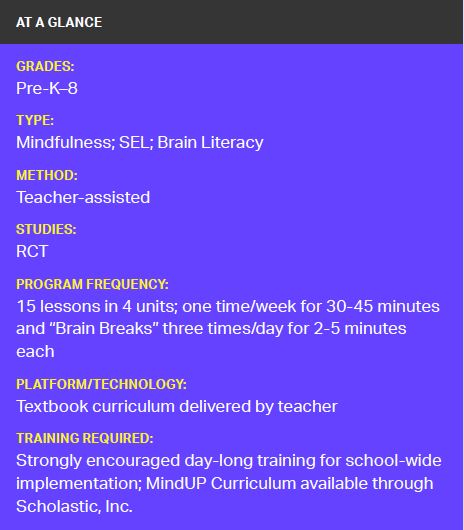 Founded in 2003 by actress Goldie Hawn’s educational foundation and a team of neuroscientists, educators, and psychologists, MindUP is a classroom program that provides a curriculum at the intersection of neuroscience, positive psychology, mindful awareness, and SEL. The aim of MindUP is to help students focus their attention, improve self-regulation skills, build resilience to stress, and develop a positive mindset in school and in life. MindUP creates a positive classroom environment and builds focus, resilience, and compassion in students, enabling them to better regulate emotions in the face of social and academic challenges.
Founded in 2003 by actress Goldie Hawn’s educational foundation and a team of neuroscientists, educators, and psychologists, MindUP is a classroom program that provides a curriculum at the intersection of neuroscience, positive psychology, mindful awareness, and SEL. The aim of MindUP is to help students focus their attention, improve self-regulation skills, build resilience to stress, and develop a positive mindset in school and in life. MindUP creates a positive classroom environment and builds focus, resilience, and compassion in students, enabling them to better regulate emotions in the face of social and academic challenges.
The MindUP curriculum is published by Scholastic Inc., and is offered in three age-related levels, Pre-K–2, Grades 3-5, and Grades 6-8. Each level consists of 15 lessons in four units—Getting Focused, Sharpening Your Senses, It’s All About Attitude, and Taking Mindful Action—taught throughout a semester or year. MindUP begins by teaching students about their brains and introducing them to mindful breathing, two themes that extend throughout the program. Daily, students and teachers engage in mindful breathing as a class—at the start of the day, before or after lunch, and before school lets out—to promote a culture of mindfulness that acts as an underpinning to the MindUP curriculum. This core practice of MindUP is the Brain Break—a focused breathing exercise with the purpose of taking a moment to calm anxiety and stress, regain focus, and live in a quiet self-empowering moment. All MindUP lessons are designed to fit into core school subjects with minimal preparation required, and to encourage mindful teaching across a school’s curriculum.
MindUP offers comprehensive training for schools interested in implementing the program. Training includes an initial on-site workshop by a Certified MindUP Consultant who prepares teachers to integrate the MindUP lessons into their classrooms. This is followed by videoconference mentoring sessions at the 1-month and 2-month mark post-launch. After a school is 3 to 5 months into its implementation, a MindUP Consultant is available for another onsite workshop to observe classroom adoption and offer grade-level coaching. A family session is also available during this second visit to help familiarize the extended school community with the MindUP approach. A final call with a MindUP Consultant and school leadership takes place 7 months into implementation to review assessment plans and discuss next steps.
A core component of the 12-month training and support program is to engage parents and families by providing tools and techniques to use MindUP in the home environment as well as in the classroom. The on-site family workshop is facilitated by a certified MindUP Consultant and is available in English and Spanish. All Certified MindUP Consultants have an extensive background in education, SEL, and mindfulness training.
Teachers who wish to individually implement the program prior to a full school adoption can purchase the curriculum through Scholastic, Inc. and review videos of sample lessons on the MindUP website. MindUP provides partner schools with an official MindUP pre- and post-evaluation toolkit to assess student outcomes, student/teacher satisfaction, and measure student/teacher social competencies.
MindUP is a CASEL SELect program, meeting high design quality and evidence-based criteria. The program has more than 10 years of independent research, including four randomized control trials. Findings have shown that students participating in the MindUP curriculum have demonstrated reduced aggression and increased prosocial behaviors and have shown gains in EF skills, math, and language arts.
OVERVIEW: www.mindup.org
WEBINAR/VIDEO/DEMO:
CONTACT: https://mindup.org/contact/
KEY STUDIES SUMMARY:
A study of 99 Canadian 4th and 5th graders, 9- to 11-years-old, approximately half male and female, participated in the curriculum once a week for 40 to 50 minutes, and practiced core mindfulness exercises (breathing and attentive listening) three times a day for approximately 3 minutes, for 4 months. Results found significant improvements in EF, positive behavioral change, improved performance in math, and increases in prosocial behavior towards self and others compared to the regular school program. (Schonert-Reichl, K. A., Oberle, E., Lawlor, M. S., Abbott, D., Thomson, K., Oberlander, T. F., & Diamond, A. (2015). Enhancing cognitive and social-emotional development through a simple-to-administer mindfulness-based school program for elementary school children: a randomized controlled trial. Developmental Psychology, 51(1), 52-66. doi:10.1037/a0038454.) https://www.ncbi.nlm.nih.gov/pmc/articles/PMC4323355/)
OTHER RESEARCH AVAILABLE:
Schonert-Reichl, K., & Lawlor, M. (2010). The effects of a mindfulness-based education program on pre-and early adolescents’ well-being and social and emotional competence. Mindfulness, 1(3), 137-151. doi: 10.1007/s12671-010-0011-8
Thierry, K., Bryant, H., Nobles, S., & Norris, K. (2016). Two-Year Impact of a Mindfulness-Based Program on Preschoolers’ Self-Regulation and Academic Performance. Early Education and Development, 27(6), 805-821. doi: 10.1080/10409289.2016.1141616. http://dx.doi.org/10.1080/10409289.2016.1141616
de Carvalho, J., Pinto, A., & Marôco, J. (2016). Results of a mindfulness-based social-emotional learning program on Portuguese elementary students and teachers: a quasi-experimental study. Mindfulness, 8(2), 337-350. doi: 10.1007/s12671-016-0603-z. https://www.psicologia.ulisboa.pt/wp-content/uploads/2020/03/Carvalho-Marques-Pinto-Maroco-2017-Mindfulness.pdf